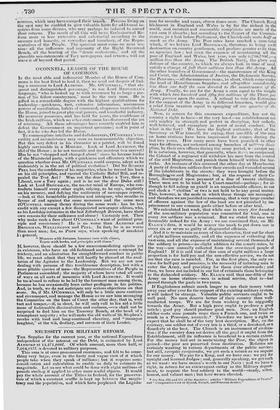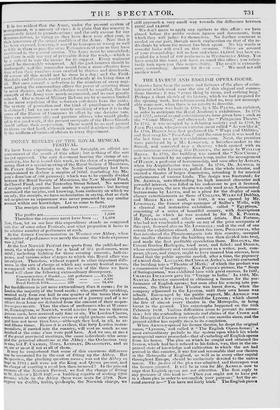NECESSITY FOR MILITARY REFORM.
THE Supplies for the current year, or the national Expenditure independent of the interest on the Debt, is estimated by Lord ALTHORP at 14,471,000/. Of which amount, more than half, or 7,664,817/. is devoted to military purposes. This sum is at once pronounced enormous, and felt to be some- thing very large, even in the hasty and vague view of it which people take when they speak of millions; but it requires some consideration and calculation to enable us duly to estimate its magnitude. Let us see what could be done with eight millions of pounds sterling if applied to other more useful objects. It would pay the whole amount of the Tithes in Ireland, for the preserva- tion of which a constant scuttle is kept up between the magis- tracy and the population, and which have perplexed the Legisla- ture for months and yearS, eleven times over. The Church Este] blishment in England and Wales is by far the richest in the world, and constant and reasonable comp'aints are made of the vast sum it absorbs ; but according ta the Report of the Commis- sioners, ju-t laid before Parliament, the Church only costs half as much as the Army. The Poor-rates have reached a sum-total which, if we believe Lord BROUGHAM, threatens to bring swift destruction on country gentlemen, and produce greater evils than an agrarian law ; but even the expense of maintaining all the poor of England and Wales, last year, was only 6,790,7991.,-4 million less than the Army. The British Navy, the glory and defence of the country. to which we always look in time of need, entails a charge of fall three millions less than the Army. All the other branches of Government—the maintenance of the King and Court, the Administration of Justice, the Diplomatic Service, the Pensions,—all the numerous items, in short, which come under the head of Miscellaneous Supplies, cost altogether considerably less than one half the sum devoted to the maintenance of the Army. Finally-, we pay for the Army a sum equal to the weight with which Iwo hundred and fifty-five millions of the Three per Cents. presses upon the nation. A refusal to vote the Estimates for the support of the Army in its different branches, would give a relief from taxation equal to sponging: off one quarter of the National Debt.
Now, in return for this enormous expenditure, has not the country a right to have—at the very least—an establishment not only mighty in strength and perfect in discipline, but orderly, well-behaved, and exemplary in point of moral conduct. Yet what is the fact? We have the highest authority, that of the Secretary at War himself, for saying, that one-fifth of the men on home stations have been imprisoned for crimes during the last two years. How many more have been punished in other ways for offences, not reckoned among breaches of mili'ery disci- pline, by their own officers during the same period, w ; cannot say. It is notorious, however, that generally, when Rear. tie compassed, the Colonel of a regiment will withdraw his men from the control of the civil Magistrate, and punish them himself within the bar- racks. An instance of this occurred the other day at Manchester. A party bf drunken soldiers drew their swords and wounded several of the inhabitants in the streets: they were brought before the Boroughreeve and Magistrates; but, at the request of their Co- lonel, discharged upon payment of a fine of twenty shillings. These men are to be tried by a Court-martial—perhaps ; for al- though to fall asleep on guard is an unpardonable offence, to cut and slash a " cixilian" or two is not held to be any great matter. This, however, is the mode in which these things are managed ; and therefore we arejustified in assuming, that a very large number of offences against the law of the land are not punished by im- prisonment in our common gaols either before or after trial. We calculated last week, that while one in every five hundred of the non-military population was committed for trial, one in every ten soldiers was a criminal. But we stated the case very favourably indeed for the Army : we are convinced that, on Mr. Ettice's data, it would be nearer the mark to put down one in every six or seven as guilty of disgraceful offences. And it is to maintain an army of this character, that not far short of eight millions annually, and all the expense of collecting this vast sum, and all the expense of maintaining several thousands of the soldiery in prison—no slight addition to the county-rates, by the way—are annually collected from the over-taxed people of England ! If it is said that of this sum of eight millions a large proportion is for half-pay and the non-effective service, we do not see that the case is mended. For, in the first place, the only ex- cuse for half-pay and pensions, is the necessity of inducing men to enter the Army, and providing for them ever afterwards ; and then, we have not included in our list of criminals those belonging to the disbanded soldiery. Mr. Etnice said that one-fifth of the Army on home stations—men in actual service, that is—bad passed through the gaols in two years.
If Englishmen submit much longer to see their money voted away year after year for the support of the existing military system, it will indeed be strange. Valuable public servants ought to be well paid. No men deserve better of their country than well- conducted troops. We are far from wishing to be niggardly towards the Army. But a high price ought to produce a good article; good pay should produce good men. Now, an English soldier costs nine pounds more than a French one, and twice as much as a Prussian, annually.* Therefore we have a right to expect that he shall be of the very best description. But, on the contrary, one soldier out of every ten is a thief, or a drunkard,or a disorderly at the best. The Church is an instrument of civiliza- tion: if the country does not derive all the goad it ought from the Establishment, still its influence is beneficial to a certain extent. For the money laid out in maintaining the Poor, the object is gained—the poor are preserved from destitution. Reforms are certainly wanting in various departments of the public service; but still, exceptis excipiendis, we get such a return as we require for our money. We pay for a King, and we have one: we pay for upright and learned Judges ; and, generally speaking, we get such as we want : we have money's worth in our Navy : and we have a right, in return for an extravagant outlay in the Military depart- ment, to require the best soldiery in the world—steady, sober, honest, and valiant men ; but here we are cheated.
• gee Nos. 232 and VI or the Spectator ; articles "Military Expenditure of France," and" Comparative Co$t of British, French, and Prussian Armies." It is too evident that the Army, under the present system of minvoinent, is a nursery of vice: it is plain that the country is enormously taxed to promote crime; and the only excuse for our Representatives, in voting as they have done year after year, is their ignorance of the actual condition of the Army. Now that it been exposed, liow ever, it would be transparent wrong as well as folly in them to puss the same Fstituates next year as they have sanctioned in the p:esent session. The Army must he remodelled; and there is only one way of peaceably doing the work,—which is by a mite al to vote the money for its suppot t. Every regiment should be thoroueltly winnowed. All the gaol-inmates should be discharged; and-the remainder would form a more effective force than alien their numbers were swelled by thieves and drunkards. Of course all this would not be done in a clay; and the Field- Marshals and O'er:ends would growl furiously at its being done at all. But once compel a reduction in the numbers of every regi- ment, giving the commanding officer the power of selecting those lie must dismiss, and the disorderlies would be expelled, the real strength of the Army very much augmented, and its cost greatly reduced. Our melons of Military Refiaim are by no means limited to the mere expulsion of the notorious evil-doers front the ranks. The system of promotion and the kind of punishmews should he changed ; but w we are now merely speaking of what it is in the rower of the House of Commons to effect by one decisive vote.
There are numerous able and patriotic officers who wieild gladly aid in the good work, if the present occupants of the Horse Guards should refuse their cooperation. There would be no real ground for alarm on that head, although many would doubtless be alleged by the uniform advocates of abuses in every department. •





















 Previous page
Previous page